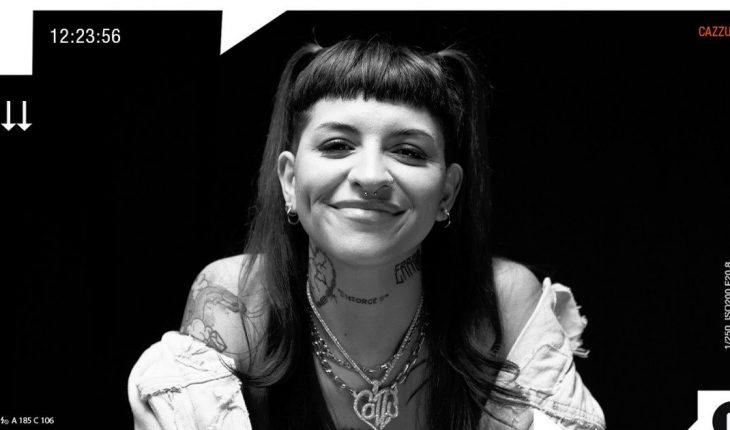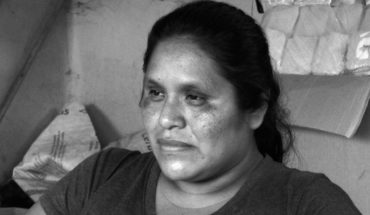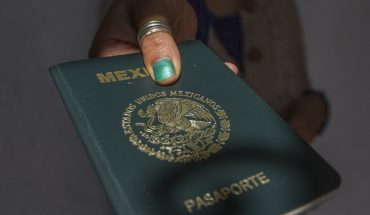Julieta Cazzuchelli AKA Cazzu finally arrived in Caja Negra and was encouraged to answer Julio Leiva’s sharp questions. “In my childhood I had different houses, different homes because we moved several times, but probably my house is Fraile Pintado… a little house that had turquoise bars, little girl, with a long corridor from which small rooms came out too, and where I imagine I was forming. A normal neighborhood, dogs on the street, noise, neighbors, a mango silver outside, a patio with many mango plants,” he begins describing. He goes on: “He has a particular story. It soils a dark history of the country and at the same time is the place where people stock up and why the people exist and have an economy. From here it looks very different.” It’s interesting to see how people here in Buenos Aires, see our places and try to exercise their authority of ideas about the daily life of a people that works in a way and always did,” he continues. “You hardly talk about it,” Cazzu says. “There is an urban legend that haunts ingenuity in Ledesma, and it is of terror. I think people over there think more about the family member than the story that represents them. When we get big, we understand it. When you understand what step it says ‘ah was this, wrong there’.” From a young age she sought them to achieve what she wanted: “We were 7/8 years old and with my best friend we decided to sell panchos in the square. Where I grew up is a risk-free place, you could go to the square alone and come back late and nothing happened. My mom and my friend’s were splitting our days, making our panchos and we’d go to the square, we had a little money. One went with a skateboard and the other stayed in the well. One day a big gentleman of bromatology came to tell us we couldn’t do that. In the innocence we had, we got a lot scared and left. We understood and were told we had to have a permit. One day we woke up, 7 and 8 years old we had, and we went to the Municipality, we asked to talk to the mayor, to ask him to let us sell panchos in the square. The secretaries were shocked, we fell with the stuffed animal there, two rats alone to ask for the mayor, no one was able to tell us no. I play a role and invent permission. We lasted three days the pancheria and that’s it. I felt the power of the decision It was that mini-Cazzu started a career of selling anything: “I get very sorry for doing things with my hands, crafts, painting. And I’ve always capitalized on it. In my childhood I had an obsession with getting money, maybe because I was aware that we lived well in my house but there was nothing else I needed. I cut my hair to sell it, to buy a Hot wheels track that still didn’t catch up with me and there wasn’t. We never lacked it, my parents worked hard, but compared to other realities around us, we couldn’t access it. That’s where creativity came from.” Cumbia and cinema were the first areas Cazzu explored most greatly: “Cumbia represents all my formation. I tell you not only musical but the formation of my personality. Salta and Jujuy are places where cumbia worked a lot. The neighborhood band existed a lot. Prior to that I had tried a rock band, but I found more professional cumbia. It was a place where they trusted me. It was 3 bands, almost 6 years of great cumbia, of all kinds of cumbia and ended up in Tucumán”. Meanwhile, on the seventh art, he says: “I went to study film because for me I didn’t make music. It didn’t matter what I knew, if I had grown up in a morally accepted music context. So studying film for me was more than anything like the NO right that I had to study music. What do you do if you study music? There’s no job.” Unfortunately in that area, it was where she felt most discriminated against and different felt: “Those who like Godard NOW like cumbia, because it is cultural. Now for the filmmaker, for the one who knows a lot, the cumbia finds it interesting. It makes me laugh. At the time it was not only cumbia but also reggaeton. I was breaking that look from above, but I always felt more tanned than anyone else around me in that context. I remember a class, in film history, surely the professor was talking about a movie kingpin and he looked at me and said ‘what’s the movie that impresses you the most?’
And I said ‘Transformers’, I could have said ‘The Glow’ and sounded cultured… but he said good!” After cumbia and cinema, the trap and reggaeton came: “At that stage I hid my past a lot. Everything was always better than being a cumbiero, no matter if the trap talked about the same thing.” In that time at best I could have hated andI monopoly, that’s when I stopped doing cumbia. You weren’t going to be somebody if you weren’t in the monopolized system. We always knew how to lock ourselves in our stage bubble, without thinking about what was going on downstairs. At the time I wasn’t allowed to hate, I just thanked, today I hate a lot of things. The very existence. Today I am of all kinds who bite, for no apparent reason. There’s no one in my gender who’d like to tell me something. I hate injustice, it has been difficult to heal the past, my patience is almost zero….”What reflection does it make today of the girl who came to Buenos Aires in search of her dreams? “It’s amazing to me when I see how many things happened to me. For months and years, too many things happened to me. I look back and look so tender but I was always fierce, determined, hard, I can’t believe that the genre I thought was the reason for my life has become reggaeton. We came across the trap much later but it’s the same love. I was 11 when I started listening to reggaeton and today I know all those guys I grew up with. I saw Them Wisin and Yandel, Rakim and Ken W, Archangel, Daddy Yankee”.Does the marginal sell? “The marginal always sold. I’m annoyed by people who are close to something because of the need to absorb the neighborhood, the street, it’s sad. There are people who can be proud because it’s their reality and another who have to be careful with feeling marginal. I remember the Biza sometimes asking me things to see that I think. He says, ‘How about a session with L-GANTE?’ And I say ‘100%’. Of all those of us who had a neighborhood, that’s the guy who masses. He represents him very set sail, I think it’s very important that you do it in fact, I said.” “I had to make the decision where I was going to stop. I suffered a lot from criticism, a lot of return to my ideas, I suffered people’s comments…. Until one day I found myself very cowardly about s stoping you in a place… Just these issues have a fast metabolism, every day it’s moving a little further. When I decided where I was going to stand, I lost the fear of criticism very recently, the fear of talking to the clearest idea. I took my place, I said here I am. It was a relief. and that’s where the Archangel thing happened. I was written by many colleagues of the genus telling me that I had many eggs, which I have no equal”; Cazzu follows, when it comes to reflecting what moment made her the Cazzu she is today, she says, “She’s a madwoman’ crowns me. It changed things for us as a genre and for the kids who made music. That had always been the goal, to change things for mines.” Towards the end of the interview, the box opens. An unexpected challenge begins. Week by week a figure will submit to the living room for dialogue and reflection. And you, are you encouraged to remember what moment clicked on your life?
translated from Spanish: Cazzu: “Today I am, of all kinds, the one who bites for no apparent reason”
April 29, 2021 |





